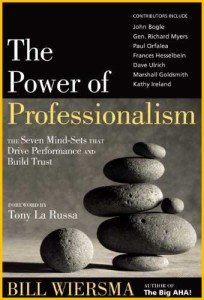One of the helpful by-products of people reading The Power of Professionalism is raising their hopes and expectations for their own organization in becoming more professional. They raise the bar, I don’t. But when things fall short, don’t be surprised when people express disappointment—or worse.
Case in point: the title of this blog comes from the subject line of an e-mail someone recently sent me. Here’s a partial list of some of things people have shared with me — experiences that they not only find unprofessional, but truly disturbing.
A. A supervisor asked one of their employees to upload the supervisor’s resume to a competitor’s website for potential employment purposes.
B. A busy-body assistant spills the beans on someone’s salary—which is higher than most other employees. Worse yet, the employee was new to the organization. So right out of the gate the new employee is ostracized– creating animosity across the entire organization.
C. The organization’s value of meritocracy is compromised when a vice president promotes his best friend—someone whose performance (let alone capabilities) were hardly worthy of promotion. The promotion is viewed as a blatant act of cronyism on the part of the vice president.
You, no doubt, have your own examples. Let’s face it, no organization is perfect. Yet most people (top performers especially) expect their organization to strive in adhering to professional ideals.
It isn’t criminal for people NOT to take pride in their organization. But feeling your organization is a joke is sad…really sad. Each of the individuals who shared their experiences with me was (at some level) was thinking of leaving. These are precisely the types of people that organizations can least afford to lose. And even if they don’t leave, their disgust leaves a wake of cynicism in its place.
It’s a price that few organizations can afford….no joke!
Next week, the other side of the story…
 We’re pleased to announce that The Power of Professionalism is now available for the iPad, iTouch, iPhone and a variety of Android devices. Here’s the link for the iTunes store:
We’re pleased to announce that The Power of Professionalism is now available for the iPad, iTouch, iPhone and a variety of Android devices. Here’s the link for the iTunes store: